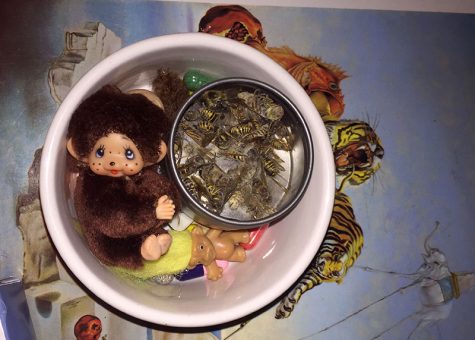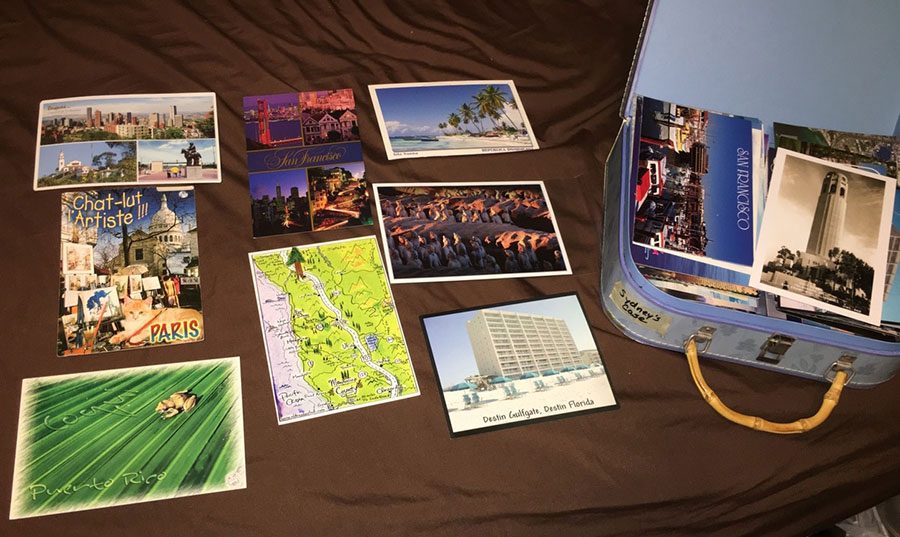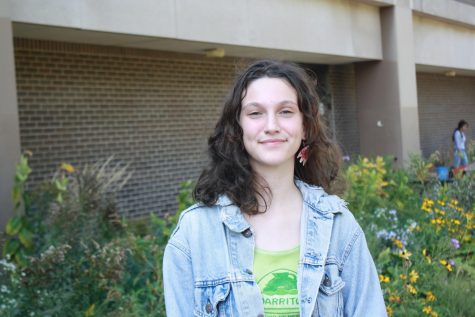Dead wasps to Yu-Gi-Oh: Student collections offer new views on an old trade.
Junior Sydney Miller’s collection of postcards. “Collect stuff you’re interested in, if you don’t collect anything whatsoever, honestly you’ll regret it… it’s cool to collect things because then you have something unique about yourself,” said Miller Photo courtesy: Sydney Miller
January 17, 2018
At some point in your life you have most likely come across a collection. Whether you’re flipping through a world record book or visiting your grandma’s house; you’ll probably find a trove of beloved treasures. Maybe collections of bars of soap and fake flowers. Maybe of Garbage Pail Kids and fur coats. But what do the students at South collect?
Junior Sheyenne Atheneos collects agates. Agates are gemstones characterized by their striped layers, formed by various minerals layering over each other. Because of this each agate is unique in color and shape. Atheneos says she was influenced by relatives: “My family, especially my gramma and mom, think they’re pretty and apparently they’re kind of a big deal. There’s collectors, this one guy found [a huge one] and I think he got a lot of money for it.”
Atheneos and her family travel to Duluth often to look for agates, however Atheneos feels the collection is more of a pastime for her: “It’s just a cool activity.” While important to her family, agates don’t take up much space in her life: “I don’t know where any are right now [but I keep them in] paper cups around the house. Sometimes we put them in jars with water, they’re kind of glowy.”
Some students have more obscure collections, such as Stella Clark, a senior this year at South. Clark’s collection is one of a kind and more focused on mortality. “I collect dead wasps that I find and if they’re not dead when I find, I house them until they die,” said Clark. The collection started on a whim; an accidental encounter down the road. “I was just walking home one day and I found a dead wasp on the ground and I was like ‘I’m gonna keep this’ and I kept walking and found two more.” The thought of wasps represents something more to Clark then just bugs. “Everything’s dying but I feel like housing these dying wasps and giving them a nice last couple of hours before they pass on is really nice, and then saving their memory, not letting them just go to dust.”
Although Clark doesn’t consider herself a materialistic person she would be disappointed if the collection was lost: “I’d be a little sad. It’s been two years of my life collecting these wasps and taking care of them.”
Clark’s wasps are housed in a box, and sometimes she even takes them to school. “I would just be like ‘Here’s my bees,’ ” said Clark. “When I tell people I collect bees they’re like ‘Wow that’s really gross, why do you do that?’… but I feel like everybody has a little a niche.”
While receiving criticism for her collection in the past, Clark isn’t bothered by people’s ideas of her or her collection. “I feel like people think that I’m very odd, I mean I am kind of an odd human but I feel like everybody has that sort of thing to them,” said Clark. “I’m not ashamed of [collecting wasps]. I used to be last year when I started doing it…but then you know I have like 50 wasps now, like so many,”
Clark continued to say her collection has changed into something new for her: “I have some mental illnesses and I feel like collecting bees is kind of like a coping mechanism. If something’s on my mind I try to just go outside and get some bees,” said Clark. “Just doing little things like that like really helped my brain…like ‘Wow I’ve actually done something with my life,’ even though it’s super minimal and pointless, I’m still doing something.”

On the other hand, student’s collections can also mean something more to them than just an object or an activity. Junior Sydney Miller’s collection of postcards and international coins are important to her for what it represents: “I try to get a postcard from every place I go no matter how cool or boring it is and my coin collection is really special to me because a lot of the coins I have are from my family,” said Miller. “Family is important to me.”
Coincidentally, Miller was influenced to start her collections by close relatives: “I started collecting postcards because my grandma had a condo in Destin, Florida and when I started getting postcards from there I was like ‘Ok this is cool.’ ” To Miller, postcards are a good way to remember a place you visited: “You can write a little note to yourself about something you loved about the place and it’s a really good memory.”
She also appreciates the thought behind receiving a postcard from someone else. “[Postcards] are a very cheap way for my friends to bring me back something from a place they went and it means that they had to think about me… that means a lot to me.”
Miller had first started collecting American quarters until a cousin in the Navy, stationed abroad, began sending her money from Japan. “The coins from the first time my cousin sent me coins are in a special pouch from Japan that I keep on my nightstand.” From then on, Miller’s international money collection has only grown.Miller also believes that collecting things should be taken seriously; “It’s never weird to have a collection.”
Finally Miller offers words of advice, “Collect stuff you’re interested in, if you don’t collect anything whatsoever, honestly you’ll regret it… it’s cool to collect things because then you have something unique about yourself.”
However many collections can mean a lot simply because it’s what you grew up with.
Senior Max Folina has a collection stemming from childhood nostalgia; Yu-Gi-Oh cards. “Yu-Gi- Oh is a card game similar to Magic, it was originally intended for kids which is why I got into it but then as the game evolved… it became super competitive and the rules changed… and now it’s just a bunch of teenagers that play,” said Folina.
Originally he started playing Yu-Gi-Oh at six years old: “I went to summer camp and these kids were playing it and I just kind of learned and so for a long time it was a nostalgia thing and I just kind of kept them around because I looked back fondly on those memories.” Later on in life, Folina gained a new appreciation. “In middle school I met someone who was actually interested in it as well and we started playing more,” said Folina. “I went to a tournament and I realized that it was really complicated and that there was a huge new scene for it.”
Folina isn’t afraid to to admit that his interests are viewed as immature: “When people think of people who play card games the first thing that comes to mind is ‘Oh you’re a child,’ [which is] valid, a lot of people in this school are children, myself included,” said Folina jokingly. “But I started to realize how complex and how huge of a community it actually is.”
However now Folina feels his collection has less of a presence in his life: “I would say it’s value has deteriorated greatly over the past month and a half, just because I have no time to play. [Sentimentally], it’s less valuable to me than my instruments, but it’s more valuable to me than my schoolwork just because it has a lot of memories in it.”
Now his cards mainly stay on the porch of his house, “There’s just cardboard boxes filled with Yu-Gi-Oh cards, like three or four [boxes],” said Folina.
Overall Folina is quick to talk about his collection and acknowledge it’s quirks: “It’s weird but I just enjoy it a lot.
All in all collecting things is a pastime many partake in and for various reasons make an important part of their life.






